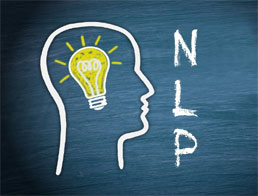
-
Call Us
+91-7617777911 -
Email Us
punlp@punlp.in

Neuro Linguistic Programming, as the name suggests –‘neuro’ refers to brain, ‘linguistic’ refers to language and ‘programming’ is the installation of a strategy, procedure or plan. NLP is the study of what works in thinking, language, and behavior. It provides a systematic framework for directing our brain and body. It defines the way how we code and produce excellence which enables us to achieve the results that we want in each area of life. With NLP, you can create a set of strategies that can work for you as to how you will make decisions, build lasting relationships, create excellence in your personal and professional life, communicate to motivate your fellow men, and create balance in your life.
NLP is software manual for the bio-computer situated between your two ears. NLP is an effective tool with which you can produce desired results and enjoy peak in your work. It works as a peak performance technique for you.
Today, around the world, NLP is being practiced by Therapists, Counselors, Students, Stage Performers, Sportspersons, CEO’s, Managers, Corporate Executives, Self-Employed People, Businesspersons, Sales and Multi Level Marketing (MLM) leaders, and Politicians.
NLP helps you to develop your ability to tap into your unconscious mind and draw on its awesome potential.
NLP helps you to develop your ability to generate cooperation and trust in people around you.
NLP helps you to develop your ability to manage your thoughts and feelings so that you are in control of your emotions.
NLP helps you be more flexible so that you have a number of choices over the challenges and situations in your personal and professional life.
NLP helps you develop new ways of behavioral choices that support you irrespective of the changes in the external world.
NLP helps you to determine your's and others's value hierarchy and resolves any conflict.
NLP helps you to have the ability to positively reframe any situation, challenge or behavior to produce more choices.
NLP helps you to give permanence to any experience.

The thirteen presuppositions are the central principles of NLP; they are its guiding philosophy, its ‘beliefs’. These principles are not claimed to be true or universal. You do not have to believe they are true. They are called presuppositions because you pre-suppose them to be true and then act as if they were. You then discover what happens. If you like the results then continue to act as if they are true. They form a set of ethical principles for life.
We do not know what reality is. Our senses, beliefs, and past experience give us a map of the world from which to operate. A map can never be exactly accurate; otherwise it would be the same as the ground it covers. We do not know the territory, so for us, the map is the territory. Some maps are better than others for finding your way around. We navigate life like a ship through a dangerous area of sea; as long as the map shows the main hazards, we will be fine. When maps are faulty and do not show the dangers, then we are in danger of running aground. NLP is the art of changing these maps, so we have greater freedom of action.
Always try to have a map for yourself that gives you the widest and richest number of choices. Act always to increase choice. The more choices you have, the freer you are and the more influence you have.
A person always makes the best choice they can, given their map of the world. The choice may be self-defeating, bizarre or evil, but for them, it seems the best way forward. Give them a better choice in their map of the world and they will take it. Even better give them a superior map with more choices in it.
No one is wrong or broken. They are carrying out their strategies perfectly, but the strategies may be poorly designed and ineffective. Find out how you and others do, what they do, so that their strategy can be changed to something more useful and desirable.
Our actions are not random; we are always trying to achieve something, although we may not be aware of what that is.
All our actions have at least one purpose - to achieve something that we value and that benefits us. NLP separates the intention or purpose behind an action from the action itself.
The unconscious is everything that is not in consciousness at the present moment. It contains all the resources we need to live in balance.
This response may be different to the one you wanted. There are no failures in communication, only responses and feedback. If you are not getting the result you want, change what you are doing. Take responsibility for the communication.
There are no unresourceful people, only unresourceful states of mind.
Mind and body interact and mutually influence each other. It is not possible to make a change in one without the other being affected. When we think differently, our bodies change. When we act differently we change our thoughts and feelings.
Develop your sense so that they become more accurate and give you better information and also help you think more clearly.
If one person can do something it is possible to model it and teach it to others. In this way everyone can learn to get better results in their own way, you do not become a clone of the model – you learn from them.
The learning is in the doing.
PEOPLE SKILLS: People skills in action studying NLP gives you an edge when it comes to interactions with friends, family, coworkers, employers and even in romantic relationships. You are more likely to achieve harmony and mutual satisfaction.
Academic courses introduce important concepts and tools. You will soon find yourself putting the pieces together to better manage your own interpersonal interactions. Positive relationships are the key to happiness, balance and an overall better quality of life.
Remember, the field of NLP is dedicated to understanding and exploring human behaviour - why we think, feel and behave the way we do - and how life circumstances affects the people. Delving into the motivations and intentions of others helps you build interpersonal skills. You do better when interactions with people in all kind of situations.
SUCCESS STRATEGIES: A further advantage is that you develop strategies for personal growth and success. These should be a product of your studies - if you were paying attention and relating your studies to personal life.
By learning NLP, you are able to build a platform for personal growth and development. You naturally become more aware of your own thoughts and beliefs, how you see yourself, and how these cognitions influence your everyday life. You therefore better equipped to develop strategies and habits that lea
d you towards greater life success.
PERSONAL THERAPY: You might get over your terrible fear of clowns or spiders or something else after doing NLP studies. In fact, by learning about NLP you gain a self-help tool to correct all sorts of negative thinking patterns. For example, you could use it to reduce anxiety.
RE-IMPRINTING is an important therapy technique that you are introduced to in NLP course. With some practice, you can learn to apply RE-IMPRINTING on yourself when needed. We all have negative thoughts from time to time. RE-IMPRINTING focuses on replacing negative thoughts and reactions with more positive alternative thoughts and behaviours. RE-IMPRINTING teaches that our thoughts though processes shape the way we feel, behave and even our relationships with others.
With time and practice, we can introduce and reinforce positive thoughts and response patterns. They eventually become an entrenched part of our cognitive repertoire. The benefits from improving though processes can be enormous. It's been shown that people with interpret their environment in a positive manner lead healthier and more successful lives.
PROBLEM SOLVING SKILLS: Woman pondering a problem. Your problem solving skills are improved by studying NLP. Meaning you are better able to manage life circumstances, reach personal goals, and achieve success.
Studying NLP train, you to consider problems from different perspectives, which is vital for finding the most effective and beneficial solutions. NLP teaches you to think about the way you think. This offers a great advantage when confronting life challenges and making decisions. You have a better chance of making choices in a thoughtful, considered manner that overcome any of the unwanted biases and habits that we all have.
CONCEPTUAL REASONING: If you want to become a better thinker, studying NLP is a good way to do it. Being exposed to scientific principles in NLP helps you to think, question, and reason like a scientist. Your analytical and reasoning skills will be strengthened.
The learning process doesn't just occur in the classroom. You will gradually begin to make observations and apply what you have learned in your interactions with others. This allows you to see and experience many of the theories of human behaviour in real-world scenarios.
COMMUNICATION SKILLS: NLP practitioners have good communication skills that can be applied in many situations. For example, you may have improved sense of how to write a persuasive job application, handle a job interview smoothly, or effectively introduce yourself to a new group of people. Better communication skills happen for two reasons. One is that you get the opportunity to develop your writing and presentation skills through the course. Secondly, thinking like a mentor helps you pitch your communications to get the kind of response you want. Practitioners are often employed in marketing roles because of their ability to reach and influence the audience.
BEHAVIOURAL TRAINING SKILLS: Learning NLP also offers an advantage as a behaviour trainer, whether you want to train your child, spouse, dog or even yourself. Students come to understand how people and animals can learn (and unlearn) behaviours, including how fears are developed (or extinguished). These things happen through the processes of conditioning and/or reinforcement. Studying NLP helps you to understand why people run away when they see an insect, why our heart begins to race if we hear a loud noise, or why some people are afraid of heights or flying.
MEMORISATION TECHNIQUES: A further benefit of NLP, which may be handy when studying for an exam or work presentation, is knowing memorisation techniques. NLP courses teach students the process of acquiring and using memory, as well as techniques to enhance memory abilities. In the program, you will learn the neurological bases of memory, and ways to consolidate and retrieve memory.